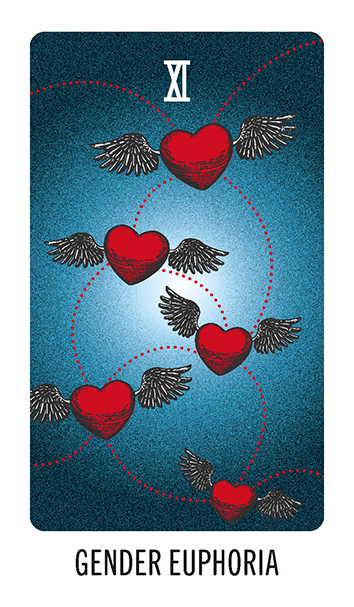Gender Euphoria
How can we feel trans joy?
Just like its opposite, gender dysphoria – gender euphoria could be experienced as within us but also influenced by external factors. We could think of a dysphoric environment as one where there is a mismatch between a person and the space (both physical and social). It is the environment that creates the barriers, not a person being trans. And of course, spaces can change and adapt.
What would need to change to make a space gender euphoric? We could think about practicalities – pronoun badges for example.
What about how we feel? How can we find what feels good?
Exercise – Keep a Gender Euphoria diary
Like a gratitude diary, which research suggests can change our brains and outlook.
It might look something like noting down what happened. What are the where, what and how’s of a moment of gender euphoria you experienced? Who was there, what was the environment like, how did the space contribute to your feelings? Noting down how you felt, this might be about your mood or feelings, a particular sensation or way your body felt or didn’t feel? It might be useful to check out a feelings and sensations chart so you can expand the language of your euphoria.
Starting with how things feel in the body can be a great way to build awareness of our feelings and get better at mapping our joys and happiness.
This is a great example of a feelings chart but there is a charge for it.
You might like to write down what moments of gender euphoria mean to you and how they help to build space for more joy in your world.
Could we feel gender euphoria through celebrating other trans people’s achievements? Could we celebrate and support trans creatives as a way of bringing more joy into the world? You could put together a Pinterest collection of trans people making good work to remind you that we are fantastic.
But how do we avoid feeling bitter or jealous instead of euphoric?
Comparing ourselves to others is not usually a useful or joyful experience. Everyone has their own thing going on.
Do you have a nemesis? You know, that trans person who seems to always have what you want. That one who shows off on social media. You know the one. What do they represent? What are we loading into them? What does our jealousy or resentment say about what we are lacking in or wanting more of right now? Do you imagine that their way of doing their gender takes away something from yours? Why so?
You might like to offer this person a little loving kindness as a way of managing the, sometimes, difficult feelings you have about them.
There’s a meditation exercise where you offer loving kindness to yourself, people you care about and the people you find tricky or are jealous of. The idea is that, by being kind to them, we are being kind to parts of ourselves too.
… in reality, the practice of loving-kindness is about cultivating love as a strength, a muscle, a tool that challenges our tendency to see people (including ourselves) as disconnected, statically and rigidly isolated from one another. Loving-kindness is about opening ourselves up to others with compassion and equanimity, which is a challenging exercise, requiring us to push back against assumptions, prejudices, and labels that most of us have internalized.
Sharon Salzberg, leading meditation teacher and author of Lovingkindness.
Have a look for a loving-kindness meditation audio online and see if you can build a different relationship to your nemesis. We wonder if feeling more loving kindness for all sorts of different people in our communities might make a world where gender euphoria feels more reachable and possible for more people.
In any community, people are growing in different directions. Recognise that people are trying to find their own version of happiness and inhabit their genders as they make sense to them.
A note on “not feeling trans enough”. Nobody feels trans enough! we give ourselves a hard time for this. One of our oral history interviewees said
I know if someone’s trans enough. If they say ‘I’m trans’. Because no one signs up for this shit willy-nilly. You know? If you go ‘I’m trans… oh, I’m not sure if I want to take hormones’, that’s a totally different thing. But whether or not you’re trans enough, that’s entirely yours.
Can we be as compassionate to ourselves as we would be to anyone else?
Another interviewee summed up the joy he finds in being trans really beautifully
So I feel really, really privileged now that I am trans; I find that it’s a beautiful thing.
To have had the opportunity to experience living in different genders and experience sort of like the world through those different lenses – very different lenses – is a real privilege actually, and a strength. And that brings me back then sort of like that first exploration on the internet for finding who I was and, you know, back to those cultures that are embracing of different genders, that that’s just normal, and where gender diverse people were actually more honoured in indigenous societies where we were seen to have a special place in those societies because of our experience. And that feels really spiritually very important to me now as well and that this is just being alive, it’s not actually anything more than that – I’m just being alive and true to me, and I want that for other people as well.

